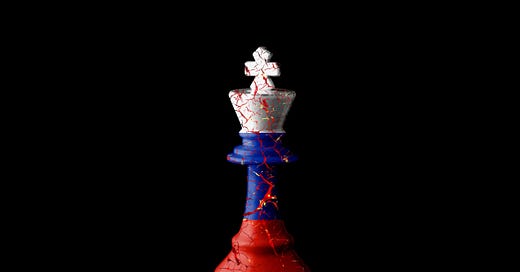The democratic West’s confrontation with Putin seems to have reached a point beyond ordinary calculation. We look for political or economic reasons for the conflict and weigh political and economic options for ending it. But the options seem not to hold much promise. Sanctions? More severe sanctions? Threats of war-crime proceedings? Encouragement to the Russian people to take to the street in protest? Putting pressure on the oligarchs or on the Russian military command? Or perhaps we might broker a deal promising concessions on Crimea or the Donbas? Sadly, Putin’s response to any of these possibilities seems likely to be the same—greater ferocity, increased indiscriminate death even for his own troops, and heightened nuclear threats. Indeed, Putin seems to eat threats up and spit them out.
Ortega y Gasset once wrote that a barbarian was a person for whom no argument made a difference. The reason to be frightened, truly frightened, is that in Putin we’re dealing not with just an autocrat, not even exactly a maniac, but a true barbarian. A person to whom no appeal to law, or treaties, or property, or truth, or even life makes any difference.
Beyond any argument or appeal, it also seems that neither threats nor bribes will change matters. We can impose the most draconian sanctions and they are likely to have, in themselves, little effect. Putin is not motivated, as perhaps his oligarchs are, by money. He may love his comforts and his palace and his fine dachas, but I doubt he is really swayed by any thought of material privation. His interests lie elsewhere.
From Achilles to Caesar to Napoleon to Stalin what motivates the most evil of human actors is not money or love or even ideology or power, but the thought of glory and the eternal life it brings. (Neither political science nor economics seem to have, in these cases, a true understanding of motivation or solutions; perhaps history, psychology, and even literature need to steady us.) Death comes to all—but glory is one way to deny the grave its victory. Yes, some hope to win deathless fame by doing good; others (sometimes far too many of them) care not how fame comes. Building up or tearing down—it matters not.
That Ukraine will be destroyed and many thousands killed is of little concern to Putin. But to be known for ages as the great restorer of Russian glory—and to bask in the fame and personal glory of having accomplished this—seems to be the sum of his concerns. It’s not just great men who change the course of History; sometimes it’s the most dreadful and depraved.
If this analysis of Putin is correct, it means that the other great causes of war—ideological fervor and religious fanaticism—are absent or only weakly present. Like those ancient tyrants who sought “deification,” only the fear of failure—or failure itself—will succeed. But sociopathic sadism in the service of personal glorification may well be the hardest thing for civilized people to defeat or even fully to understand.
Hard, for sure; but perhaps not impossible. In this conflict, Zelensky is right. All the West’s bribes and threats, sanctions and concessions, may damage Russia and Russians, but they do little to help Ukraine. Nor do they deter Putin. As with Japan and Germany in the previous century, only Putin’s defeat will restore the world’s order and turn aside this barbarism.
And when that happens, if it does, let the West do all it can to rebuild not only Ukraine, to whom the greatest debt will be owed, but Russia, too, for the Russian people have suffered in all this as well. In the meanwhile, if there is any hope for the brave Ukrainians to fend off the invaders, they need our aid—militarily: as much as we can safely give so that the Ukrainians can themselves repel the invaders; and humanitarian: since the Ukrainians cannot come close to succeeding, no how many arms they have, if starvation kills them first. Perhaps a contemporary version of the Berlin airlift is in order, with notice to Putin that if he significantly interferes with this humanitarian mission, all his dreams of glory will go down with the first plane.




